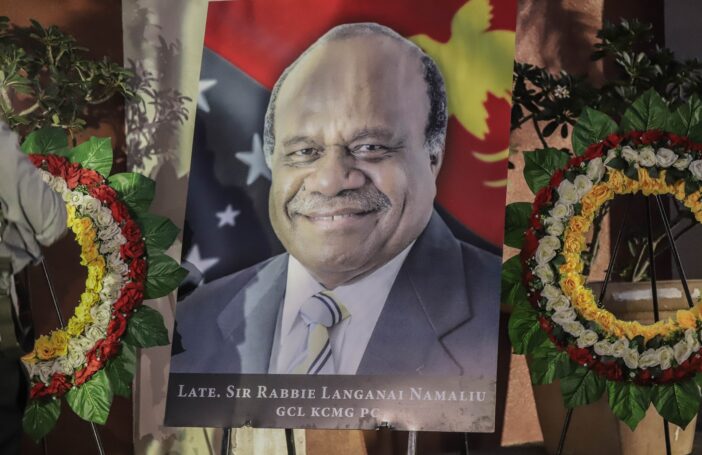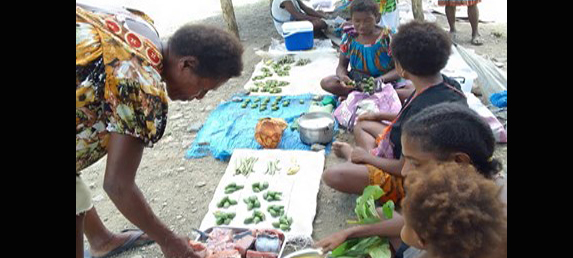This is an edited extract from the eulogy given at Sir Leonard Wilson Kamit’s funeral on 17 January 2023.
Sir Leonard Wilson Kamit was born in 1953, the eldest of nine children of John Casswell and Naomi Taroben. In 1968 he was awarded a scholarship by Mobil Oil (PNG) Ltd to attend secondary education at The Armidale School (known as TAS) in Armidale, northern New South Wales, and in 1971 he received the NSW Higher School Certificate, which enabled him to enrol in economics at the University of Papua New Guinea (UPNG) in 1972. He graduated with a Bachelor of Economics in June 1975.
When I first met Wilson, some 55 years ago at TAS, we were part of a band of brothers from the then Territory of Papua and Territory of New Guinea, all secondary education scholarship holders from either the Australian Government or Mobil Oil (PNG).
Sir Wilson said this of his time and experience at TAS, when he was addressing the Class of 71 Reunion in Armidale in 2011:
The system of selecting students under various scholarship schemes enabled us to go abroad, mainly to Australia, and gave us exposure to living, mingling and studying among and with people of different cultures to ours, and with people from different walks of life in a country more developed than ours … [T]o study away from the tribal and traditional environment enabled us to have a broader view of our country; continue to appreciate our cultures but also view ourselves as developing one big tribe of Papua New Guineans, not one loose country of 800 interests …
Sir Wilson was also very clear in his view that “Australia [had] been assisting a lot in the process of nation building of PNG; however, it [was] incumbent on our own people to take leadership and responsible roles in government and commerce in the development of our country.”
Sir Wilson’s career, apart from a brief diversion into the then Department of Housing, centred around the Bank of Papua New Guinea (BPNG). He worked there for 37 years, peaking as Governor for ten years from 1999, after which he was appointed, in December 2009, as the Alternate Director on the board of the Asian Development Bank based in Manila, Philippines.
On his return to Port Moresby in 2012 and subsequently, he was appointed to the boards of several major financial, investment and business corporations. His service and contribution to PNG’s banking and financial services sector spanned some 48 years.
I had the privilege to work with him on four particular occasions.
We were a team of three – the late Koiari Tarata, then Secretary for Treasury, Sir Wilson as Governor of BPNG, and my own role as Chief Secretary to Government – during the period 1999 to 2002 under Prime Minister Sir Mekere Morauta. We worked as a team. And we negotiated with the IMF [International Monetary Fund] missions as a team: how we enjoyed watching the baffled faces of the IMF teams with our intermittent breaks into Motu!
Sir Mekere’s term ended in August 2002, I exited from the public service in September 2002 and Secretary Tarata passed away in 2003. The task of sustaining and implementing the banking and financial sector reforms of 2000 remained squarely on the shoulders of Sir Wilson. The evidence of his success in leading and embedding the reforms is clear for all to see.
The impact of the superannuation reforms has reached the lives of millions of Papua New Guinean workers and their families – in the public service, the PNG Defence Force, Police Force and Corrective Institutions Service, and in the business and wider PNG communities. Sir Wilson once publicly declared that he had awarded himself the title “GF08 – Grandfather of Eight”, for his enduring contribution to the superannuation industry!
With the establishment of the first PNG commercial microfinance company, PNG Microfinance Ltd – with the Bank of South Pacific and the World Bank’s International Finance Corporation as a joint venture with the PNG Sustainable Development Program (PNGSDP) – Sir Wilson helped open the doors for expansion of financial services to the ordinary people.
In 2013 the government compulsorily acquired the PNGSDP shares in Ok Tedi Mining Ltd leading to major legal proceedings in PNG and Singapore. At stake was the approximately US$1.4 billion (about K4 billion) of the PNGSDP-managed long-term fund for the future of people directly affected by the operations of the Ok Tedi mine in Western Province. Throughout this unprecedented period Sir Wilson remained steadfast with Sir Mekere in protecting the long-term fund.
This legacy of good policy and leadership has definitely made a real impact on people’s lives.
More recently, in 2021, Sir Wilson, Professor Stephen Howes of The Australian National University and I were appointed by the Minister for Treasury, the Hon Ian Ling-Stuckey, as members of an Independent Advisory Group (referred to as IAG) to review the Central Banking Act and financial sector regulations. Sir Wilson’s exceptional expertise and insight was a great asset to the review. Our work is yet to be completed, and we will certainly miss Sir Wilson’s valuable contribution.
One challenge, as Sir Wilson has left with us, is in life insurance. He questioned whether life insurance be compulsory, so that the financial burden of haus krais, funeral expenses, and so forth, on surviving families is eased when one dies. And so, Sir Wilson set the example by pronouncing his personal reforming wish for “no haus krai and kastom wok”.
Sir Wilson agreed in mid-2020 to serve on the UPNG Interim Council, a largely voluntary role but very demanding of him and other members of the Interim Council. He was re-appointed in 2021 and 2022 and agreed to be re-appointed again this month. He considered it his duty to contribute to the university he graduated from, for the benefit of the next generation of students.
As Chairman of the Council’s finance committee, he discovered the immense systemic and systematic deterioration in UPNG’s financial management. And he knew what he, and we, had to do to re-establish and modernise the financial management system.
He was also deeply concerned about the accommodation of university staff, and wanted to establish a scheme in which university staff would own their own homes. And he wanted to see the university establish a banking and financial services school or centre, a vision he held whilst he was Governor of BPNG. These are the critical areas that the university will pursue.
For his services to our people and nation, Wilson was recognised and awarded by Her Majesty Queen Elizabeth II as a Commander of the British Empire (CBE) in June 2000. And in June 2009, he was awarded and appointed a Knight Bachelor (Kt), and vested the title Sir Wilson Kamit throughout the Commonwealth of Nations.
Sir Leonard Wilson Kamit, through his quiet and humble service, his leadership, his partnership with his life-long soulmate Lady Winifred, and his devotion to his family, demonstrated that we can all, individually, make a difference and make things better – for our family, for our community, for our workplace, and for our nation.
And so, Leonard Wilson Kamit, thank you for your example.




